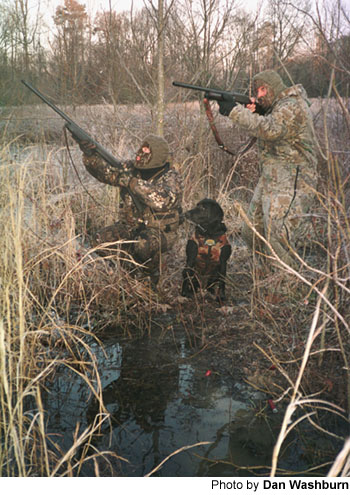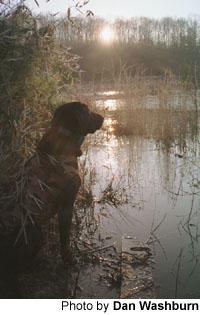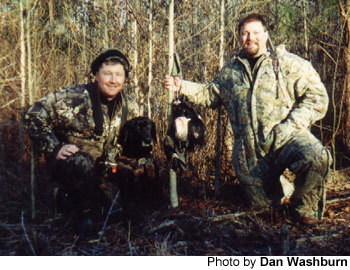
January 16, 2001 — The scene was quite peaceful, actually.
A luminous moon brightened an otherwise pitch-black, early-morning sky. Its reflection made the pond’s surface sparkle, and illuminated silhouettes of leafless trees lining the water’s banks.
It was cold and quiet — save for the constant mechanical hum coming from out on the pond.
Stuart Richardson called it “robo-duck,” a pole-mounted mallard decoy with battery-operated wings that spin round and round. “Robo” was surrounded by a dozen or so floating decoys, all placed on the water by Richardson some 45 minutes before Saturday’s sunrise.
Real ducks would join the fake ones soon; at least that was the plan. Duck hunters like when that sort of thing happens.
“Georgia is by no means known as a duck hunting destination,” the 36-year-old Richardson — North Georgia Hunting Retriever Club president and Georgia Waterfowl Association committee member — explained to me during our 5 a.m. truck drive to the Alcovy River basin in Monroe.
“But there are a fair amount of birds that move through Georgia.”
Especially so this winter. Unusually cold temperatures have forced migratory patterns farther south.
“The past four years, the winters have been so doggone mild,” lamented Richardson, of Cumming. “Duck hunters have been crying the blues. The migration never got this far. But this year has been different.”
“So the duck hunters are to blame?” I asked with a sarcastic shiver.
Richardson laughed. “We’ve been wishing this on everyone for years.”
Back at the pond, just after 7 a.m., we hunkered behind the bamboo and pine limb cover of our blind — kind of a foxhole for hunters — and watched the marsh wake up.
“Its beautiful, isn’t it?” said Brian Cantel, 40, of Flowery Branch, who rounded out our threesome. There were several other groups spread out around the pond.
 Hues of blue seeped into the charcoal sky, and our surroundings began to take shape. We were blending in quite well, I might add. Each of us was covered in camouflage, head to toe.
Hues of blue seeped into the charcoal sky, and our surroundings began to take shape. We were blending in quite well, I might add. Each of us was covered in camouflage, head to toe.
Dutch, Richardson’s 7-year-old black Labrador retriever, with a camouflage vest of her own, began to whimper a bit. Like any good hunting dog, she was anxious for things to get started. She didn’t have to wait long.
The first flight of ducks arrived at 7:06 a.m., a half-hour before sunrise, just in time for legal shooting to begin. I couldn’t see them, but I could hear them. I could hear the air rushing over their wings. I could hear their bodies skimming the once-still water.
Soon all I could hear were shotguns.
This particular hunting pond is the creation of Dave Willoughby, owner of the 173 acres of Walton County land that surround it. Willoughby, who operates a lawn care company in Monroe, diked off a 5-acre plot, planted some duck-friendly feed, and flooded the area with roughly 2.5 million gallons of the Alcovy. He’ll drain it and do the same for next year.
“If you have a lot of wildlife, no matter what it is, that’s an excellent indication that you have a healthy environment,” said Willoughby, 59, who has tweaked the millet planted in his pond, making it more palatable for waterfowl. “And if you put something back for everything you take away from it, you’ll never run out.”
The science experiment appears to be a success. Joining Georgia’s traditional wood ducks on Willoughby’s waters are droves of mallards, gadwalls and ring necks. Blue- and green-winged teals arrived this winter. Richardson even bagged an elusive black duck — a trophy bird for hunters — a few weeks ago.
“Be still, be still, be still,” Richardson whispered through the blind. It was 7:10 a.m., and seven ring necks were circling the pond. Richardson sounded one of the many duck calls that hung around his neck.
Eyes and guns aimed at the sky, and followed the ducks until they settled on the water. Then it sounded like a war. The hunt had begun.
The ducks began to arrive in bunches, one flock after another. They were looking for their morning meal.
The hunters couldn’t fire fast enough.
A kill shot is obvious. The duck falls from the sky immediately, a graceless spiral of feathers and flesh. At 7:17 a.m., Richardson shot down a ring neck, and told Dutch to retrieve it. It became obvious that’s what she was born to do.
Seconds later, she swam back with a dying duck in her mouth and pride in her eyes.
Richardson wrung the duck’s neck, and returned his attention to the sky. Soon he placed another dead ring neck next to the first one. A pile of spent shotgun shells began to form, as well.
Shortly after 8 a.m., the call of “Birds!” from one of the other blinds ended our conversation abruptly. Dutch was already studying the sky intently.
Two mallards circled above. The ducks took on an orange glow as they flew before the rising sun. They settled on water to our left. But the hunters did not have a clear shot. Not yet, at least.
They would soon. The mallards took off and flew directly in front of our blind. I think I saw one of them wink.
Richardson and Cantel unloaded on the birds.
Six perfect shots. Six perfect misses. There was silence, and then …
“Pathetic,” Richardson exclaimed. “That should have been two fat green heads right there. We ought to get our shirttails cut for that.”
“I think they were bulletproof,” Cantel added with a smile.
The duo atoned minutes later. A single gadwall flew by, and Richardson and Cantel both nailed it with single shots.
The hunting slowed after that. And at 8:40 a.m., we prepared to leave — which, I was told, is a sure sign that ducks would soon arrive. I was told correctly.
Five mallards appeared in the sky, and quickly became the focus of everyone’s attention. They looped and looped, but never landed. They knew better, and flew away.
With that, we left, too. Walking off, I couldn’t stop looking up at the sky.

